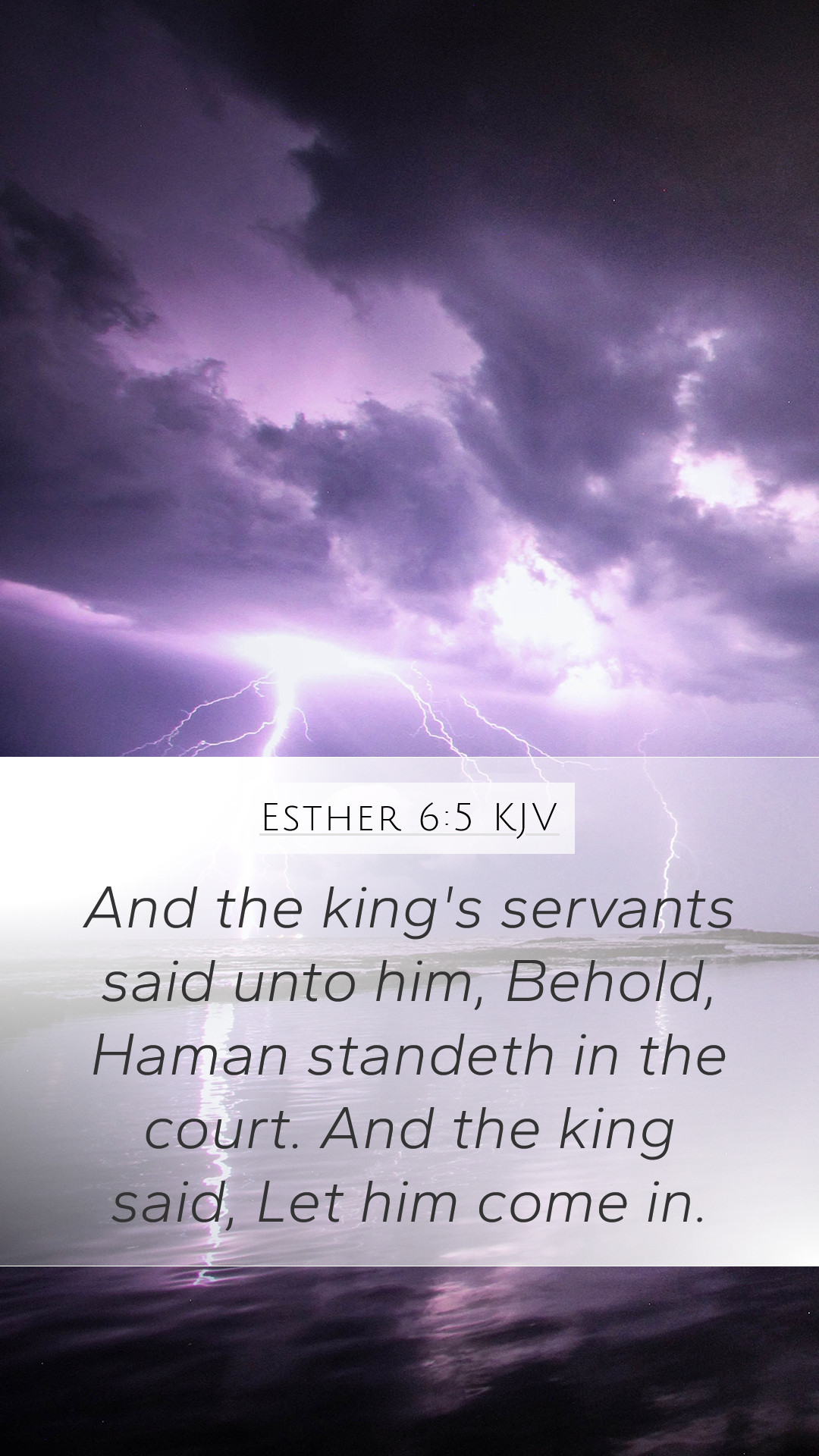Old Testament
Genesis Exodus Leviticus Numbers Deuteronomy Joshua Judges Ruth 1 Samuel 2 Samuel 1 Kings 2 Kings 1 Chronicles 2 Chronicles Ezra Nehemiah Esther Job Psalms Proverbs Ecclesiastes Song of Solomon Isaiah Jeremiah Lamentations Ezekiel Daniel Hosea Joel Amos Obadiah Jonah Micah Nahum Habakkuk Zephaniah Haggai Zechariah MalachiEsther 6:5 Meaning
What is the meaning of Esther 6:5?
And the king's servants said unto him, Behold, Haman standeth in the court. And the king said, Let him come in.
Esther 6:5 Bible Verse Meaning
Bible Verse Commentary on Esther 6:5
Esther 6:5 states: "And the king said, Who is in the court? Now Haman was come into the outward court of the king's house, to speak unto the king to hang Mordecai on the gallows that he had prepared for him."
Understanding the Context
This verse takes place at a pivotal moment in the Book of Esther, highlighting the dramatic unfolding of events that led to the deliverance of the Jewish people. The context surrounding Esther 6:5 is essential for grasping its significance, as it showcases the contrasting fates of Haman and Mordecai.
Verse Meaning and Insights
- Divine Timing: Matthew Henry emphasizes the divine providence in the timing of events. Haman arrives at the king's court just as the king is reviewing his records, indicating that God's hand is orchestrating the events for the deliverance of Mordecai.
- Character Contrast: Adam Clarke points out the stark contrast between Haman's evil intentions and Mordecai's nobility. While Haman seeks to destroy Mordecai, the king unwittingly prepares to honor him instead, demonstrating the theme of reversal throughout the narrative.
- Fulfillment of Justice: Albert Barnes notes the foreshadowing of justice. Haman's plot is about to backfire, illustrating that those who plot against the righteous ultimately fall into their own traps.
Significance of Esther 6:5
Esther 6:5 is significant as it marks a turning point in the narrative. The verse captures a moment when Haman believes he is in control, yet it is the king’s search for clarity that leads to Haman’s imminent downfall. This illustrates a key theme in the Bible: God’s sovereignty over human affairs.
Application in Bible Study
This verse offers great insight for Bible study groups and online Bible study sessions. It illustrates how to interpret Bible verses by examining their context and the character dynamics involved. Studying the implications of this verse can lead to fruitful discussions around Bible study tools that help uncover deeper meanings.
In-Depth Analysis
In terms of understanding Scripture, this verse invites readers to consider how justice operates in God’s plan. Haman's entrance into the court with malicious intent juxtaposes the king’s awareness of Mordecai's earlier service, showing how actions can trigger divine responses.
Cross-References
- Proverbs 11:21: "Though hand join in hand, the wicked shall not be unpunished: but the seed of the righteous shall be delivered."
- Galatians 6:7: "Be not deceived; God is not mocked: for whatsoever a man soweth, that shall he also reap."
- Psalm 9:15-16: "The heathen are sunk down in the pit that they made: in the net which they hid is their own foot taken. The Lord is known by the judgment which he executeth: the wicked is snared in the work of his own hands."
Conclusion
In conclusion, Esther 6:5 serves as a profound reminder of God’s providence and justice. For those seeking a bible verse commentary or biblical exegesis on this passage, it reveals how God can use even the darkest plots for His purposes. Understanding such Bible verse meanings can enrich your Bible study insights and enhance your ability to interpret scripture.


